外研版九年级下册Module 6 Eating together Unit 3(共44张PPT)
文档属性
| 名称 | 外研版九年级下册Module 6 Eating together Unit 3(共44张PPT) | 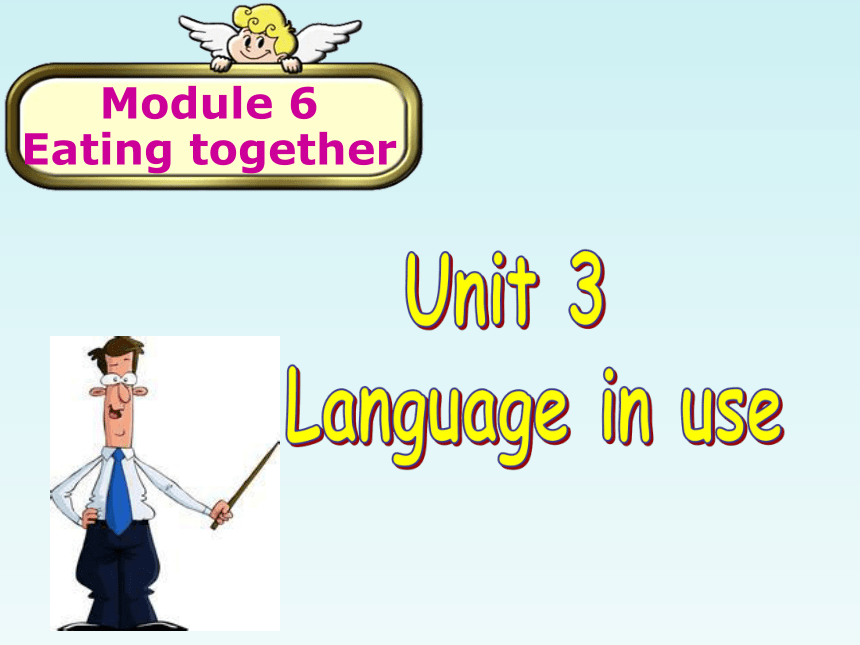 | |
| 格式 | ppt | ||
| 文件大小 | 9.9MB | ||
| 资源类型 | 教案 | ||
| 版本资源 | 外研版 | ||
| 科目 | 英语 | ||
| 更新时间 | 2022-08-20 19:19:51 | ||
图片预览


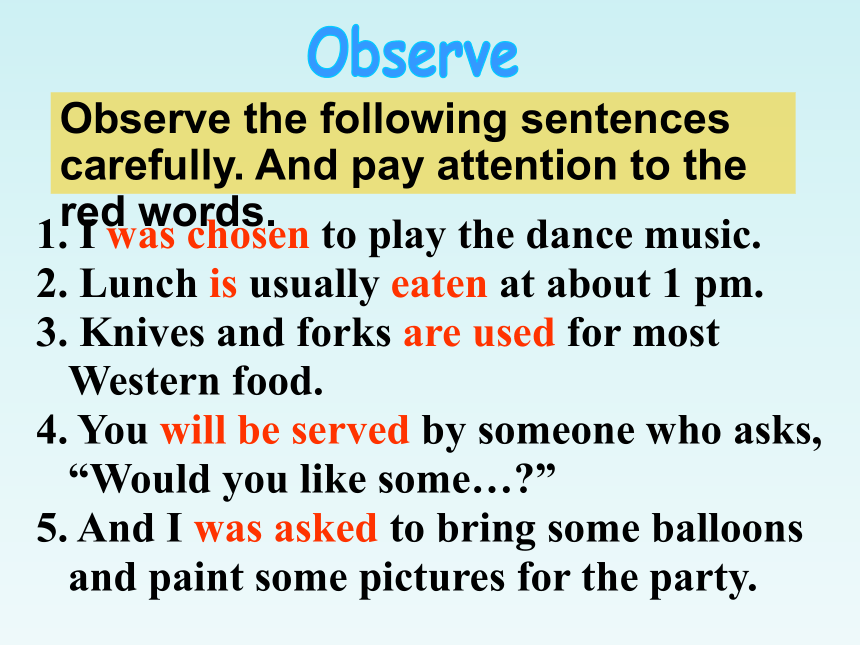
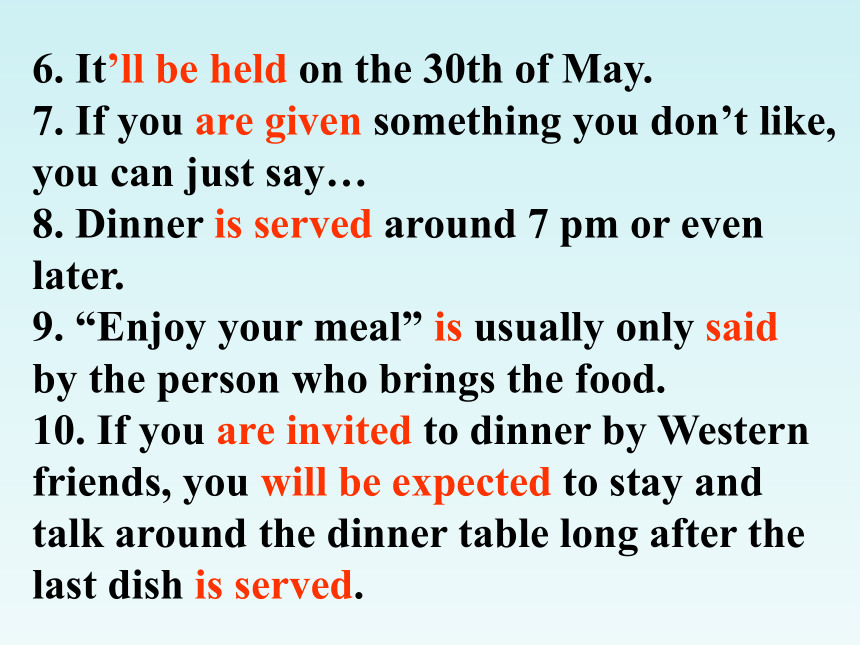
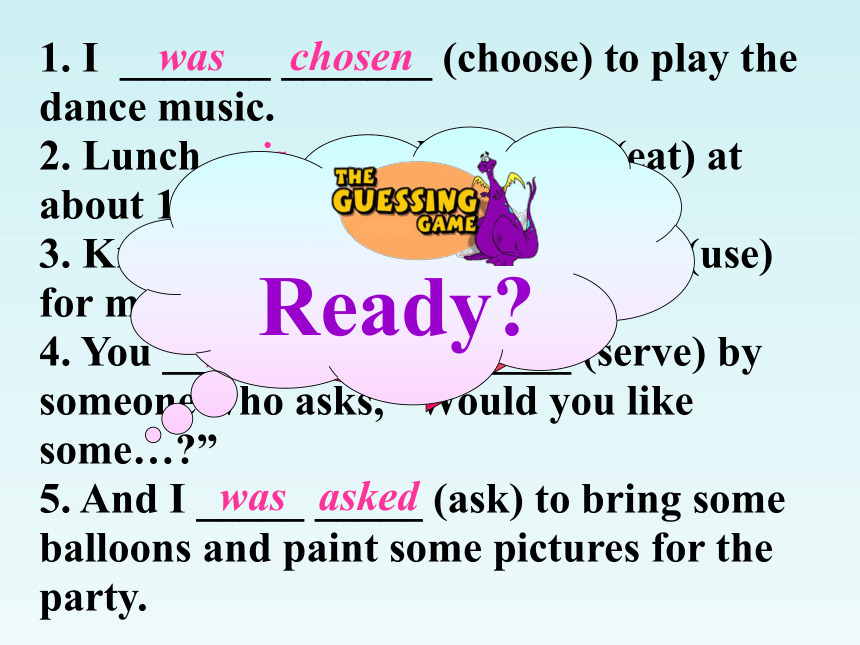
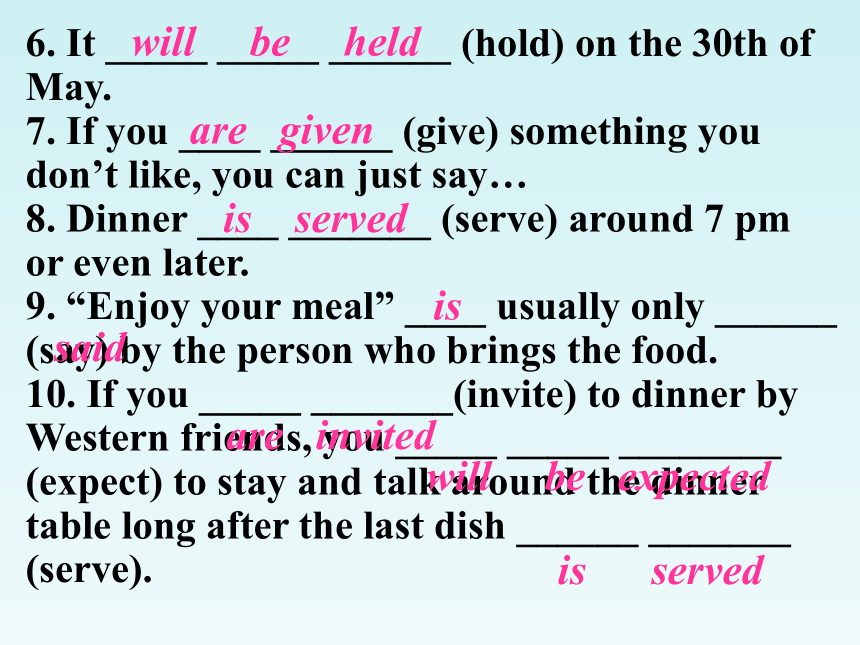

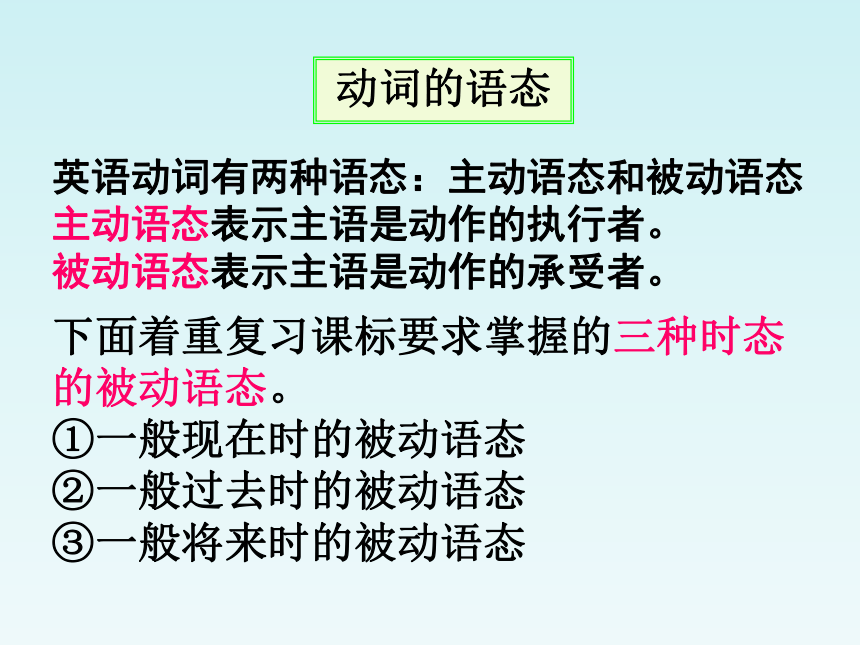
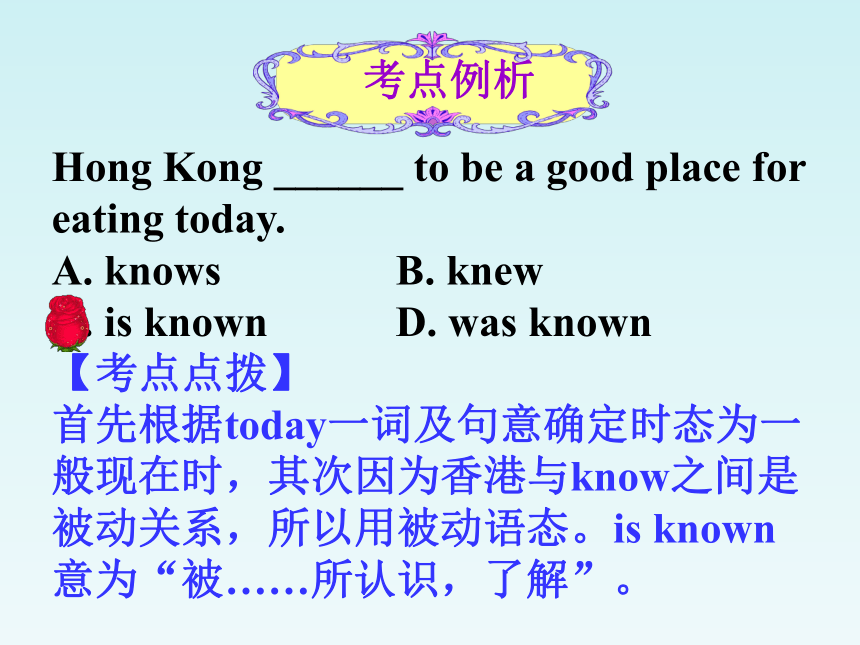
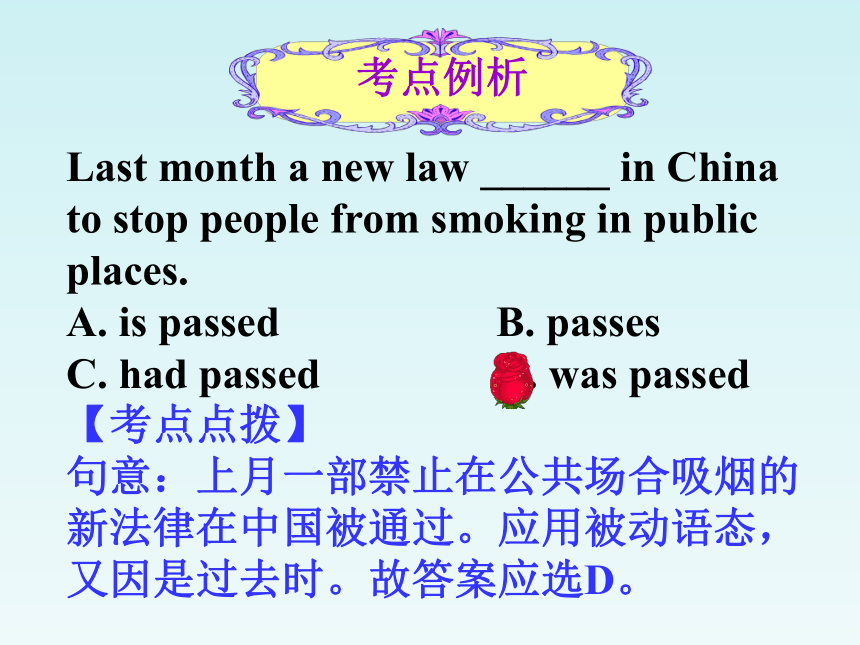

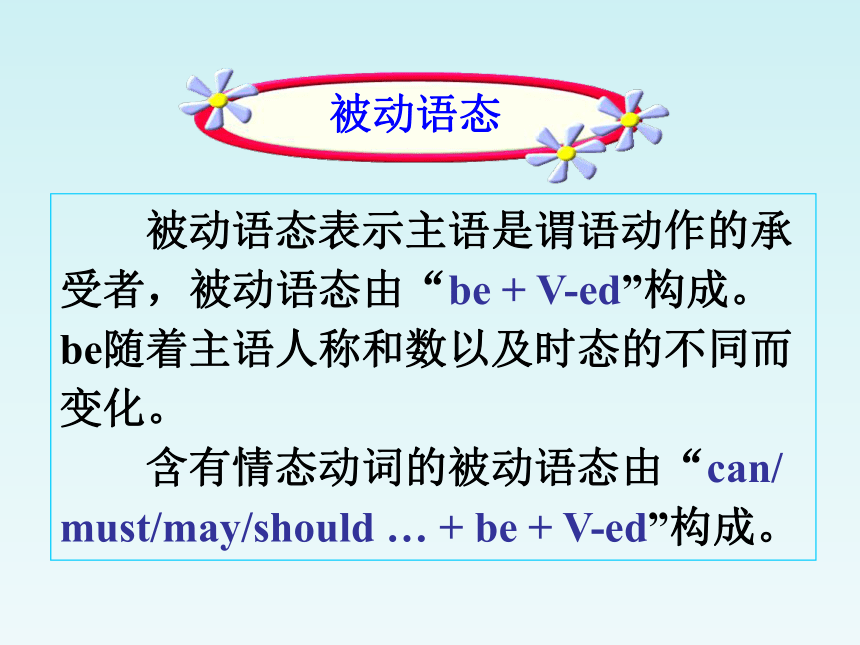
文档简介
(共44张PPT)
Module 6
Eating together
To consolidate the use of passive voice
Objective
1. I was chosen to play the dance music.
2. Lunch is usually eaten at about 1 pm.
3. Knives and forks are used for most Western food.
4. You will be served by someone who asks, “Would you like some… ”
5. And I was asked to bring some balloons and paint some pictures for the party.
Observe the following sentences carefully. And pay attention to the red words.
6. It’ll be held on the 30th of May.
7. If you are given something you don’t like, you can just say…
8. Dinner is served around 7 pm or even later.
9. “Enjoy your meal” is usually only said by the person who brings the food.
10. If you are invited to dinner by Western friends, you will be expected to stay and talk around the dinner table long after the last dish is served.
1. I _______ _______ (choose) to play the dance music.
2. Lunch _____ usually ______ (eat) at about 1 pm.
3. Knives and forks ______ ______ (use) for most Western food.
4. You ______ ______ ______ (serve) by someone who asks, “Would you like some… ”
5. And I _____ _____ (ask) to bring some balloons and paint some pictures for the party.
was chosen
is eaten
are used
will be served
was asked
go
Ready
6. It _____ _____ ______ (hold) on the 30th of May.
7. If you ____ ______ (give) something you don’t like, you can just say…
8. Dinner ____ _______ (serve) around 7 pm or even later.
9. “Enjoy your meal” ____ usually only ______ (say) by the person who brings the food.
10. If you _____ _______(invite) to dinner by Western friends, you _____ _____ ________ (expect) to stay and talk around the dinner table long after the last dish ______ _______ (serve).
will be held
are given
is served
is
are invited
will be expected
is served
said
动词的语态
英语动词有两种语态:主动语态和被动语态
主动语态表示主语是动作的执行者。
被动语态表示主语是动作的承受者。
下面着重复习课标要求掌握的三种时态的被动语态。
①一般现在时的被动语态
②一般过去时的被动语态
③一般将来时的被动语态
考点例析
Hong Kong ______ to be a good place for eating today.
A. knows B. knew
C. is known D. was known
【考点点拨】
首先根据today一词及句意确定时态为一般现在时,其次因为香港与know之间是被动关系,所以用被动语态。is known意为“被……所认识,了解”。
考点例析
Last month a new law ______ in China to stop people from smoking in public places.
A. is passed B. passes
C. had passed D. was passed
【考点点拨】
句意:上月一部禁止在公共场合吸烟的新法律在中国被通过。应用被动语态,又因是过去时。故答案应选D。
考点例析
A new factory is being built in Neijiang. I hope it ______ at the end of this year.
A. will be finished B. finishes
C. will finish
【考点点拨】
首先at the end of this year表达的是将来的时间,所以用将来时,根据句意“……被完成”,应用被动语态,故选A。
被动语态表示主语是谓语动作的承受者,被动语态由“be + V-ed”构成。
be随着主语人称和数以及时态的不同而变化。
含有情态动词的被动语态由“can/ must/may/should … + be + V-ed”构成。
被动语态
The first section of New College
English is designed for speaking practice
and is based on pictures and topics.
These computers were made in our own country last year.
You are going to/will be invited to a big meal.
①一般现在时的被动语态:am/is/are + V-ed
②一般过去时的被动语态:was/were + V-ed
③一般将来时的被动语态:be going to/will + be + V-ed
1. 有些动词可以有两个宾语,在用于被动结构时,可以把主动结构中的一个宾语变为主语,另一宾语仍然保留在谓语后面。通常变为主语的是间接宾语(指人的宾语)。
一些特殊的被动语态
They didn’t offer Ann the job.
→Ann wasn’t offered the job.
2. 在使役动词have, make, get以及感官动词see, watch, notice, hear, feel, observe等后面用不定式作宾语补足语时,在主动结构中不定式to要省略,但变为被动结构时,要加 to。
They make her clean the floor.
She is made to clean the floor by them.
3. It + be + V-ed + that从句
(=主语+ be + V-ed + to do sth.)
表示:据说/据报道/据悉/据信等……
据说这个男孩已经通过了这次全国性的测试。
It is said that the boy has passed the
national exam.
The boy is said to have passed the
national exam.
4. 有些短语动词在意义上相当于及物动词,因此也可构成被动语态。短语动词被看成一个整体,是固定词组,所以构成被动语态时不可分开。其被动语态构成方法与普通的及物动词的被动语态的构成方法相同。
1)动词+介词
He will be operated on by the best surgeon.
他将由最好的外科医生给他动手术。
This matter has been carefully looked into.
此事已得到仔细调查。
2) 动词+副词
These problems have been seriously thought over.
这些问题已得到认真考虑。
The lights are turned off at 11 pm every day.
每天晚上11点钟关灯。
3) 动词+副词+介词
These privileges should be done away with.
此类特权应该被取消。
4) 动词+名词+介词
The children have been taken good care of.
这些孩子得到了很好的照料。
1. 某些感官动词加形容词及少数其他的动词本身可以表示被动意义。例如:
smell, taste, prove, sell, etc.
1) The dish tastes delicious.
2) The theory proved right at last.
3) The book is so interesting that it sells
well.
不可以变成被动语态的情况
need + V- ing 表示“主语承受动词发
出的动作”,表示被动意义。
我的车需要修理。
My car needs repairing.
(= to be repaired).
战争爆发了。
The war broke out.
但不能说:The war was broke out.
3. 通常只有及物动词(组)才有被动语态,不及物动词没有。
以下部分为课本练习,供老师在对答案时选择使用。
LUNCH SERVED DAILY FROM 12 PM TO 2 PM
Don’t take food into the meeting rooms
Dogs not allowed
Park open for picnics
Closed until 10 am
1. Lunch _______ daily from 12 pm to 2 pm.
2. Food ________________ into the meeting rooms.
3. The park _______ for picnics.
4. Dogs _____________ in the restaurant.
5. The shop _______ until 10 am.
is served
should not be taken
is open
are not allowed
is closed
Complete the explanations of the signs.
1
P52
Guests at a new restaurant in London (1) _______ (serve) by blind waiters. But the waiters are not the only people who cannot see. The guests cannot see either, because the restaurant (2) ______ (keep) dark. No lights (3)__________ (allow), not even the light on your mobile phone. The idea is that when you cannot see, your sense of taste (4) __________________________________________ (improve). “Don’t worry that you won’t enjoy food without seeing it. You can (5) ______ (enjoy) it using your nose, fingers and tongue instead,” promises the restaurant manager.
are served
is kept
are allowed
is improved/ improves / will improve/ will be improved
enjoy
Complete the passage with the correct form of the words in brackets.
2
P52
On my mother’s birthday, my father took us to a lovely restaurant to celebrate. I (1) ________ the menu and looked at the good things to (2) _______. We (3) _______ chicken, noodles and soup. Everything (4) ________ delicious. Then I (5) _______ for some ice cream while my parents (6) _______ some coffee. My mother was given a birthday cake and a dish filled with fruit. Then my father (7) _______ the bill. It was cold outside, so he (8) _______ a taxi. We (9) ________ our coats and went home. My mother was very happy, and it was a perfect evening.
ask call drink eat order pay pick up put on taste
picked up
eat
ordered
tasted
asked
drank
paid
called
put on
Complete the passage with the correct form of the words and expressions in the box.
3
P53
a) Is there any food you don’t eat
b) Would you like something to drink
c) Would you like some more soup
d) Anything else
e) And have you had one of these yet
f) Is there anything you especially like
1. A: Eric, have you ever had jiaozi
B: Yes, but I can never remember the different names.
A: (1) ________
B: Well, I really don’t know…
A: OK. (2) _______
B: Well, I don’t eat beef. But I like any kind of fish or vegetables.
A: Then let me order some food for you.
f
a
Complete the conversations with the sentences in the box.
4
P53
3. A: (5) _______
B: Yes, please. It’s delicious.
A: (6) _____ They’re a kind of dumpling.
B: Mm, they look good. What’s inside them
A: Meat and vegetables.
B: Mm, they’re really good!
c
e
2. A: Good morning. Are you ready to order
B: Yes, I am. Thank you. I’ll have tomato
soup and chicken wings, please.
A: (3) _______
B: I’ll have an orange juice and some iced tea.
A: (4) _______
B: Could I have some apple pie
A: Certainly.
b
d
P54
Listen and number the pictures.
5
2
3
1
P54
Listen again and choose the correct answer.
6
1. The person who went to Britain put his knife and fork on his plate because _____.
a) He finished his meal
b) He did not want to talk with knife and fork in his hand
c) He did not like the food
2. The person who went to France offered everyone small dishes of food because _______.
a) She thought they were for everyone
b) She was not polite
c) She was not French
3. The person who had a Chinese meal drank from the finger bowl because _____.
a) it had a lemon in it
b) she was hungry
c) she thought it was soup
P54
Read the email and answer the questions.
7
1. What is Richard worried about
2. How many courses are usual for a dinner in the West
3. Why should Richard practise using chopsticks
4. Why are the plates placed in the middle of the table in China
5. Is it a good idea to talk about food during a meal in China Why or why not
He’s worried about what he should and shouldn’t do as a guest in China.
Check the answers.
1. What is Richard worried about
2. How many courses are usual for a dinner in the West
In the West, there are usually three courses for dinner.
3. Why should Richard practise using chopsticks
Richard should practise using chopsticks because he may find it difficult.
4. Why are the plates placed in the middle of the table in China
The plates are placed in the middle of the table because they are for everyone to share.
5. Is it a good idea to talk about food during a meal in China Why or why not
Yes. It is a good idea to talk about the food in China because preparation has taken a long time.
时态 主动语态 被动语态
一般现在时 do / does am / is / are + done
一般过去时 did was / were + done
一般将来时
will / be going to + do will / be going to + be + done
一般现在时、一般过去时和一般将来时的主动结构和被动结构 (以动词do为例):
Ⅰ. 单项选择。
1. — How clean your office is! _____ it
______ every day
— Of course. We clean it by turns (轮流).
A. Does; clean B. Is; cleaned
C. Did; clean D. Was; cleaned
2. — Can I take the magazines out
— No, sir. They ____ out of the reading
room. It’s a rule.
A. needn’t be taken B. can’t take
C. mustn’t be taken D. mustn’t take
3. — Susan, why are you still here
They are ready to start.
— I’m sorry, but I ____ when to meet.
A. don’t tell B. didn’t tell
C. haven’t told D. wasn’t told
4. — David, turn off the TV if no one is
watching it.
— But it _____ off already! The
music is from the radio.
A. is turned B. has turned
C. has been turned D. will be turned
5. It’s reported that the new library
_____ in the near future.
A. will be finished
B. was finished
C. is finished
D. has been finished
II. 用所给单词的适当形式完成下列句子。
1. The newspaper ___________ (bring) to
school yesterday.
2. Your dress ______________ (finish) in
three days.
3. An interesting programme __________
(show) on TV last night.
4. Students _____________ (not allow) to
take their mobile phones to school.
was brought
will be finished
was shown
aren’t allowed
Ⅲ. 将下列句子改为被动语态。
1. Many students enjoy cartoon films in our school. ___________________________________________________________
2. Our English teacher always makes us recite (背诵) the texts. _________________________________________________________________
3. My mother often made up (编造) stories for me when I was a child. _____________________________________________________________
Cartoon films are enjoyed by many students in our school.
We are always made to recite the texts by our English teacher.
Stories were often made up for me by my mother when I was a child.
4. You must do your homework at once.
_________________________________
5. People have used paper money for over a thousand years.
_______________________________
_______________
They are going to open the road to traffic next month. _________________________________ _________________________
Paper money has been used for over a thousand years.
The road is going to be opened to traffic next month.
Your homework must be done at once.
Ⅳ. 中考链接。
1. A cook will lose his job if he ____ to smoke in the kitchen. (2015 海南)
A. finds B. found C. is found
2. You can’t wear shoes inside this place. It ______. (2015 江西南昌)
A. doesn’t allow B. isn’t allowed
C. hasn’t allowed D. wasn’t allowed
3. Our new library ____ last year. We enjoy reading and studying in it.
(2015重庆)
A. builds B. built
C. is built D. was built
4. — Mike, I looked for you everywhere
last night.
— Oh, I ____ to the party.
(2015 四川广安)
A. am invited B. invited
C. invite D. was invited
1. Finish the exercises in Learning English.
2. Preview the new words and expressions in Module 7.
Module 6
Eating together
To consolidate the use of passive voice
Objective
1. I was chosen to play the dance music.
2. Lunch is usually eaten at about 1 pm.
3. Knives and forks are used for most Western food.
4. You will be served by someone who asks, “Would you like some… ”
5. And I was asked to bring some balloons and paint some pictures for the party.
Observe the following sentences carefully. And pay attention to the red words.
6. It’ll be held on the 30th of May.
7. If you are given something you don’t like, you can just say…
8. Dinner is served around 7 pm or even later.
9. “Enjoy your meal” is usually only said by the person who brings the food.
10. If you are invited to dinner by Western friends, you will be expected to stay and talk around the dinner table long after the last dish is served.
1. I _______ _______ (choose) to play the dance music.
2. Lunch _____ usually ______ (eat) at about 1 pm.
3. Knives and forks ______ ______ (use) for most Western food.
4. You ______ ______ ______ (serve) by someone who asks, “Would you like some… ”
5. And I _____ _____ (ask) to bring some balloons and paint some pictures for the party.
was chosen
is eaten
are used
will be served
was asked
go
Ready
6. It _____ _____ ______ (hold) on the 30th of May.
7. If you ____ ______ (give) something you don’t like, you can just say…
8. Dinner ____ _______ (serve) around 7 pm or even later.
9. “Enjoy your meal” ____ usually only ______ (say) by the person who brings the food.
10. If you _____ _______(invite) to dinner by Western friends, you _____ _____ ________ (expect) to stay and talk around the dinner table long after the last dish ______ _______ (serve).
will be held
are given
is served
is
are invited
will be expected
is served
said
动词的语态
英语动词有两种语态:主动语态和被动语态
主动语态表示主语是动作的执行者。
被动语态表示主语是动作的承受者。
下面着重复习课标要求掌握的三种时态的被动语态。
①一般现在时的被动语态
②一般过去时的被动语态
③一般将来时的被动语态
考点例析
Hong Kong ______ to be a good place for eating today.
A. knows B. knew
C. is known D. was known
【考点点拨】
首先根据today一词及句意确定时态为一般现在时,其次因为香港与know之间是被动关系,所以用被动语态。is known意为“被……所认识,了解”。
考点例析
Last month a new law ______ in China to stop people from smoking in public places.
A. is passed B. passes
C. had passed D. was passed
【考点点拨】
句意:上月一部禁止在公共场合吸烟的新法律在中国被通过。应用被动语态,又因是过去时。故答案应选D。
考点例析
A new factory is being built in Neijiang. I hope it ______ at the end of this year.
A. will be finished B. finishes
C. will finish
【考点点拨】
首先at the end of this year表达的是将来的时间,所以用将来时,根据句意“……被完成”,应用被动语态,故选A。
被动语态表示主语是谓语动作的承受者,被动语态由“be + V-ed”构成。
be随着主语人称和数以及时态的不同而变化。
含有情态动词的被动语态由“can/ must/may/should … + be + V-ed”构成。
被动语态
The first section of New College
English is designed for speaking practice
and is based on pictures and topics.
These computers were made in our own country last year.
You are going to/will be invited to a big meal.
①一般现在时的被动语态:am/is/are + V-ed
②一般过去时的被动语态:was/were + V-ed
③一般将来时的被动语态:be going to/will + be + V-ed
1. 有些动词可以有两个宾语,在用于被动结构时,可以把主动结构中的一个宾语变为主语,另一宾语仍然保留在谓语后面。通常变为主语的是间接宾语(指人的宾语)。
一些特殊的被动语态
They didn’t offer Ann the job.
→Ann wasn’t offered the job.
2. 在使役动词have, make, get以及感官动词see, watch, notice, hear, feel, observe等后面用不定式作宾语补足语时,在主动结构中不定式to要省略,但变为被动结构时,要加 to。
They make her clean the floor.
She is made to clean the floor by them.
3. It + be + V-ed + that从句
(=主语+ be + V-ed + to do sth.)
表示:据说/据报道/据悉/据信等……
据说这个男孩已经通过了这次全国性的测试。
It is said that the boy has passed the
national exam.
The boy is said to have passed the
national exam.
4. 有些短语动词在意义上相当于及物动词,因此也可构成被动语态。短语动词被看成一个整体,是固定词组,所以构成被动语态时不可分开。其被动语态构成方法与普通的及物动词的被动语态的构成方法相同。
1)动词+介词
He will be operated on by the best surgeon.
他将由最好的外科医生给他动手术。
This matter has been carefully looked into.
此事已得到仔细调查。
2) 动词+副词
These problems have been seriously thought over.
这些问题已得到认真考虑。
The lights are turned off at 11 pm every day.
每天晚上11点钟关灯。
3) 动词+副词+介词
These privileges should be done away with.
此类特权应该被取消。
4) 动词+名词+介词
The children have been taken good care of.
这些孩子得到了很好的照料。
1. 某些感官动词加形容词及少数其他的动词本身可以表示被动意义。例如:
smell, taste, prove, sell, etc.
1) The dish tastes delicious.
2) The theory proved right at last.
3) The book is so interesting that it sells
well.
不可以变成被动语态的情况
need + V- ing 表示“主语承受动词发
出的动作”,表示被动意义。
我的车需要修理。
My car needs repairing.
(= to be repaired).
战争爆发了。
The war broke out.
但不能说:The war was broke out.
3. 通常只有及物动词(组)才有被动语态,不及物动词没有。
以下部分为课本练习,供老师在对答案时选择使用。
LUNCH SERVED DAILY FROM 12 PM TO 2 PM
Don’t take food into the meeting rooms
Dogs not allowed
Park open for picnics
Closed until 10 am
1. Lunch _______ daily from 12 pm to 2 pm.
2. Food ________________ into the meeting rooms.
3. The park _______ for picnics.
4. Dogs _____________ in the restaurant.
5. The shop _______ until 10 am.
is served
should not be taken
is open
are not allowed
is closed
Complete the explanations of the signs.
1
P52
Guests at a new restaurant in London (1) _______ (serve) by blind waiters. But the waiters are not the only people who cannot see. The guests cannot see either, because the restaurant (2) ______ (keep) dark. No lights (3)__________ (allow), not even the light on your mobile phone. The idea is that when you cannot see, your sense of taste (4) __________________________________________ (improve). “Don’t worry that you won’t enjoy food without seeing it. You can (5) ______ (enjoy) it using your nose, fingers and tongue instead,” promises the restaurant manager.
are served
is kept
are allowed
is improved/ improves / will improve/ will be improved
enjoy
Complete the passage with the correct form of the words in brackets.
2
P52
On my mother’s birthday, my father took us to a lovely restaurant to celebrate. I (1) ________ the menu and looked at the good things to (2) _______. We (3) _______ chicken, noodles and soup. Everything (4) ________ delicious. Then I (5) _______ for some ice cream while my parents (6) _______ some coffee. My mother was given a birthday cake and a dish filled with fruit. Then my father (7) _______ the bill. It was cold outside, so he (8) _______ a taxi. We (9) ________ our coats and went home. My mother was very happy, and it was a perfect evening.
ask call drink eat order pay pick up put on taste
picked up
eat
ordered
tasted
asked
drank
paid
called
put on
Complete the passage with the correct form of the words and expressions in the box.
3
P53
a) Is there any food you don’t eat
b) Would you like something to drink
c) Would you like some more soup
d) Anything else
e) And have you had one of these yet
f) Is there anything you especially like
1. A: Eric, have you ever had jiaozi
B: Yes, but I can never remember the different names.
A: (1) ________
B: Well, I really don’t know…
A: OK. (2) _______
B: Well, I don’t eat beef. But I like any kind of fish or vegetables.
A: Then let me order some food for you.
f
a
Complete the conversations with the sentences in the box.
4
P53
3. A: (5) _______
B: Yes, please. It’s delicious.
A: (6) _____ They’re a kind of dumpling.
B: Mm, they look good. What’s inside them
A: Meat and vegetables.
B: Mm, they’re really good!
c
e
2. A: Good morning. Are you ready to order
B: Yes, I am. Thank you. I’ll have tomato
soup and chicken wings, please.
A: (3) _______
B: I’ll have an orange juice and some iced tea.
A: (4) _______
B: Could I have some apple pie
A: Certainly.
b
d
P54
Listen and number the pictures.
5
2
3
1
P54
Listen again and choose the correct answer.
6
1. The person who went to Britain put his knife and fork on his plate because _____.
a) He finished his meal
b) He did not want to talk with knife and fork in his hand
c) He did not like the food
2. The person who went to France offered everyone small dishes of food because _______.
a) She thought they were for everyone
b) She was not polite
c) She was not French
3. The person who had a Chinese meal drank from the finger bowl because _____.
a) it had a lemon in it
b) she was hungry
c) she thought it was soup
P54
Read the email and answer the questions.
7
1. What is Richard worried about
2. How many courses are usual for a dinner in the West
3. Why should Richard practise using chopsticks
4. Why are the plates placed in the middle of the table in China
5. Is it a good idea to talk about food during a meal in China Why or why not
He’s worried about what he should and shouldn’t do as a guest in China.
Check the answers.
1. What is Richard worried about
2. How many courses are usual for a dinner in the West
In the West, there are usually three courses for dinner.
3. Why should Richard practise using chopsticks
Richard should practise using chopsticks because he may find it difficult.
4. Why are the plates placed in the middle of the table in China
The plates are placed in the middle of the table because they are for everyone to share.
5. Is it a good idea to talk about food during a meal in China Why or why not
Yes. It is a good idea to talk about the food in China because preparation has taken a long time.
时态 主动语态 被动语态
一般现在时 do / does am / is / are + done
一般过去时 did was / were + done
一般将来时
will / be going to + do will / be going to + be + done
一般现在时、一般过去时和一般将来时的主动结构和被动结构 (以动词do为例):
Ⅰ. 单项选择。
1. — How clean your office is! _____ it
______ every day
— Of course. We clean it by turns (轮流).
A. Does; clean B. Is; cleaned
C. Did; clean D. Was; cleaned
2. — Can I take the magazines out
— No, sir. They ____ out of the reading
room. It’s a rule.
A. needn’t be taken B. can’t take
C. mustn’t be taken D. mustn’t take
3. — Susan, why are you still here
They are ready to start.
— I’m sorry, but I ____ when to meet.
A. don’t tell B. didn’t tell
C. haven’t told D. wasn’t told
4. — David, turn off the TV if no one is
watching it.
— But it _____ off already! The
music is from the radio.
A. is turned B. has turned
C. has been turned D. will be turned
5. It’s reported that the new library
_____ in the near future.
A. will be finished
B. was finished
C. is finished
D. has been finished
II. 用所给单词的适当形式完成下列句子。
1. The newspaper ___________ (bring) to
school yesterday.
2. Your dress ______________ (finish) in
three days.
3. An interesting programme __________
(show) on TV last night.
4. Students _____________ (not allow) to
take their mobile phones to school.
was brought
will be finished
was shown
aren’t allowed
Ⅲ. 将下列句子改为被动语态。
1. Many students enjoy cartoon films in our school. ___________________________________________________________
2. Our English teacher always makes us recite (背诵) the texts. _________________________________________________________________
3. My mother often made up (编造) stories for me when I was a child. _____________________________________________________________
Cartoon films are enjoyed by many students in our school.
We are always made to recite the texts by our English teacher.
Stories were often made up for me by my mother when I was a child.
4. You must do your homework at once.
_________________________________
5. People have used paper money for over a thousand years.
_______________________________
_______________
They are going to open the road to traffic next month. _________________________________ _________________________
Paper money has been used for over a thousand years.
The road is going to be opened to traffic next month.
Your homework must be done at once.
Ⅳ. 中考链接。
1. A cook will lose his job if he ____ to smoke in the kitchen. (2015 海南)
A. finds B. found C. is found
2. You can’t wear shoes inside this place. It ______. (2015 江西南昌)
A. doesn’t allow B. isn’t allowed
C. hasn’t allowed D. wasn’t allowed
3. Our new library ____ last year. We enjoy reading and studying in it.
(2015重庆)
A. builds B. built
C. is built D. was built
4. — Mike, I looked for you everywhere
last night.
— Oh, I ____ to the party.
(2015 四川广安)
A. am invited B. invited
C. invite D. was invited
1. Finish the exercises in Learning English.
2. Preview the new words and expressions in Module 7.
同课章节目录
- Module 1 Travel
- Unit 1 We toured the city by bus and by taxi
- Unit 2 It's a long story.
- Unit 3 Language in use
- Module 2 Education
- Unit 1 They don't sit in rows.
- Unit 2 What do I like best about school?
- Unit 3 Language in use
- Module 3 Life now and then
- Unit 1 They sometimes work harder.
- Unit 2 I think life is better today.
- Unit 3 Language in use.
- Module 4 Rules and suggestions
- Unit 1 You must be careful of falling stones.
- Unit 2 we must keep the camp clean.
- Unit 3 Language in use.
- Revison A
- Module 5 Look after yourself
- Unit 1 We'd better get you to hospital.
- Unit 2 Get off the sofa!
- Unit 3 Language in use.
- Module 6 Eating togethe
- Unit 1 When is the school-leavers' party?
- Unit 2 Knives and forks are used for most Western
- Unit 3 Language in use
- Module 7 English for you and me
- Unit 1 Have you ever been to an English corner?
- Unit 2 We all own English.
- Unit 3 Language in use
- Module 8 My future life
- Unit 1 Here's to our friendship and the future
- Unit 2 I know that you will be better at maths.
- Unit 3 Language in use
- Revison B
